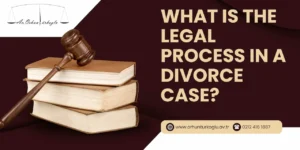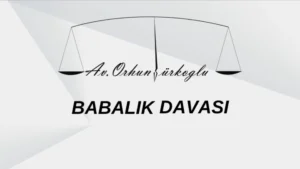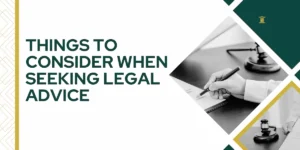Traffic accident is defined as an incident occurring on the road involving motorized, non-motorized, and special-purpose vehicles used for transporting people, animals, and goods, as well as construction machinery and rubber-wheeled tractors, resulting in death, injury, and material damage. Types of lawsuits arising from traffic accidents can be classified as follows:
Compensation for physical harm, including material and moral damages Compensation for death Material and moral damages suffered by the relatives of the accident victim Claims for vehicle and property damage compensation
LIABILITY FOR TRAFFIC ACCIDENT COMPENSATION This article will address compensation for physical harm in terms of material and moral damages. A person who suffers physical harm due to a traffic accident can claim their damages from the responsible party and other liable parties within the framework of the law. Accordingly, the person responsible for the damage, along with any vehicle operator, driver, assistants, carriers, and insurers, are also liable alongside the party at fault.
TYPES OF COMPENSATION CLAIMS FOR TRAFFIC ACCIDENTS The types of damages a person who suffers physical harm due to a traffic accident can claim under the law (Turkish Civil Code Article 54) are as follows:
Medical expenses Loss of earnings Losses resulting from a decrease or loss of working capacity Losses arising from the disruption of economic future
MEDICAL EXPENSES The injured party can initially claim all expenses incurred for the treatment of their physical harm from the responsible parties listed above. This includes all expenses related to treatment, including travel expenses to and from the hospital or caregiver expenses. The injured person can claim all treatment-related expenses from the party at fault and other liable parties until they fully recover from the accident. For example, if the person’s relatives incur expenses for treatment purposes or if the injured person is affected psychologically by the accident, psychological support expenses would also be included in medical expenses. Depending on the circumstances of each case, the expenses involved can vary, and the injured party can claim all expenses incurred and to be incurred from the party at fault and other liable parties.
LOSS OF EARNINGS Loss of earnings refers to the loss suffered by a person due to a temporary or permanent reduction in income resulting from physical harm caused by an accident. In cases of complete recovery, temporary loss of earnings is applicable, while in cases of permanent injuries, there would be a lifelong loss of income. The categories listed in numbers 2, 3, and 4 under loss of earnings in the law can further explain this concept. In this context, the injured party can claim the following from the party at fault and other liable parties:
- Material and moral compensation for loss of earnings due to permanent disability or, even if there is no decrease in income due to the person’s occupation, compensation for physical and moral damages due to loss of effort.
- If the disability is severe and the injured person becomes dependent on others for care throughout their life, caregiver expenses (the expenses will be determined considering the person’s entire life)
- In case of temporary incapacity for work, loss of earnings, and the value of the injured person’s labor during the recovery period, along with the need for assistance and care from others during the recovery period
STATUTE OF LIMITATIONS In compensation lawsuits arising from traffic accidents, the statute of limitations is two years from the date the damage and the responsible party are known, and in any case, ten years from the date of the accident. In addition, if the law arises from an action requiring criminal punishment, the statute of limitations for criminal offenses will apply. Accordingly, if there is an injury requiring punishment in the accident, the statute of limitations will be eight years, and if there is a death, the statute of limitations will be fifteen years from the date of the accident.
COMPETENT AND AUTHORIZED COURT AND INSURANCE ARBITRATION BOARD As a duty, compensation lawsuits arising from traffic accidents will be heard in Commercial Courts or Civil Courts of First Instance, depending on the nature of the incident. The courts where the accident occurred have jurisdiction as competent courts, and additionally, according to the general jurisdiction rule, the courts of residence of the defendants and the courts of residence of the injured party are also competent. Additionally, it should be noted that claims against insurance companies can be heard by the Insurance Arbitration Board. In this case, the applicant can go to the Insurance Arbitration Board for all debt items they can demand from the insurance company; however, for other debt items and moral compensation claims, lawsuits can be filed in general courts. The Insurance Arbitration Board provides an advantage in terms of speed for the applicant, avoiding long litigation periods. By at least applying to the Insurance Arbitration Board for some of their claims, the applicant can quickly obtain their receivables compared to general courts.
JUDICIAL PRECEDENTS Supreme Court Assembly of Civil Chambers Decision 2011/17-351 E., 2011/386 K. Judgment: “…The dispute brought before the General Assembly of Civil Chambers through the objection procedure revolves around whether the minimum wage amount closest to the date of the judgment or the date on which the document issued for the payment, considered as an advance payment, is dated should be taken as the basis for calculating the compensation, ultimately determining the amount on which the compensation will be calculated. It is worth emphasizing that when the unjust act is committed against bodily integrity, the real extent and amount of the damage can be better determined over time; therefore, the most appropriate date should be taken into account in determining and calculating the damage. The provision of Article 46 of the 818th number Civil Code (CC) titled “Required Damage and Loss in Case of Bodily Harm” states verbatim; “A person who suffers bodily harm can claim all the damage and loss incurred due to his or her inability to work fully or partially and the deprivation of income that will result from it in the future, as well as all expenses. If it is not possible to determine the consequences of bodily harm with sufficient conviction during the conclusion of the judgment; within two years from the announcement of the judgment, the judge has the authority to preserve his examining power.” The 45th article of the same Law, titled “Damage and Loss in Case of Death,” also states: “In the event of a person’s death, the damage and loss, especially burial expenses, are included. If death has not occurred immediately, the damage and loss include treatment expenses and the damage caused by the inability to work. If other persons are deprived of the deceased’s assistance as a result of death, their damage must also be compensated.” These regulations show that the damage should be calculated according to the situation at the time of the judgment, and accordingly, the minimum wage closest to the date of the judgment should be taken into account for support compensation. The calculation made by the court and the result reached are not appropriate for this determination. Therefore, the task to be performed by the court is to obtain an additional report from the expert regarding the determination of the minimum wage closest to the date of the judgment and the calculation of the support compensation based on this, and to make a decision accordingly. 08.06.2011″
Y21H:E:2016/699 Decision 2016/326: … Furthermore, both the repealed Civil Code’s Article 47 and the current Civil Code No. 6098 Article 56 foresee that the judge, considering the characteristics of the event, can decide to pay an appropriate amount of money to the victim as moral damages. The amount awarded to the victim as moral damages must be appropriate to justice. This compensation, which has a function similar to compensation that brings moral peace to the victim, should have a unique quality. It does not aim to be a punishment or to compensate for damage in terms of civil law. Therefore, the limit of this compensation should be determined according to its purpose. The amount to be determined should be sufficient to achieve the effect of satisfaction desired in the current state. The 26.06.1966 dated and 7/7 numbered Decision of the Supreme Court Assembly of Civil Chambers clearly shows the special circumstances and conditions that will affect the amount of moral compensation to be determined. Since these may vary according to each case, when exercising his discretion, the judge should also indicate the reasons that are effective in his decision at the proper place according to objective criteria. Although the task of determining the amount of moral compensation is left to the discretion of the judge, the amount awarded should be proportionate to the moral damage suffered, alleviate the sadness felt, and be in line with developments in law to provide a deterrent effect alongside the feeling of satisfaction. (HGK 23.6.2004, 13/291-370) It is clearly evident from these explanations that, in the specific case, as the plaintiff’s attorney did not object to the account report dated 29/01/2010 and stated in the amendment petition that the damage to his client was determined in the said expert report, an acquired procedural right was formed in favor of the defendants; therefore, while it should have been ruled in favor of the amount of material compensation determined in this 29/01/2010 dated account report, it is not correct to decide excessively by exceeding the acquired procedural right, and the awarded 20,000.00 TL moral compensation in favor of the plaintiff is also excessive. The decision made in the written form without taking into account the material and legal facts is contrary to procedural and substantive law and is the reason for annulment. 04/05/2016″
For professional assistance and inquiries, you can reach us at our contact numbers.








